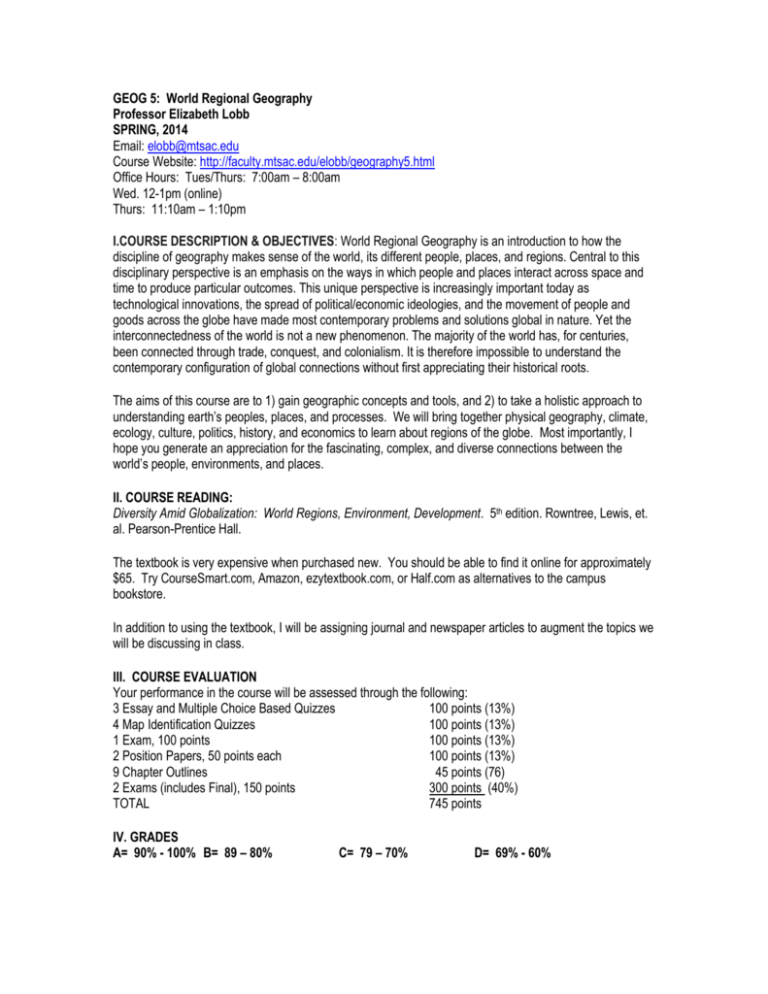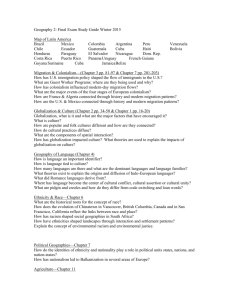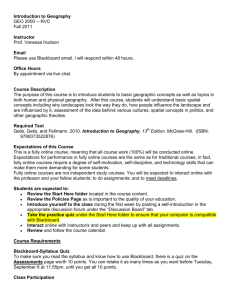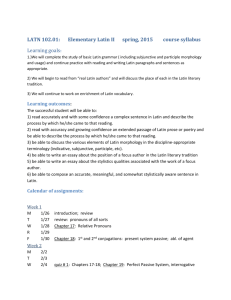
GEOG 5: World Regional Geography
Professor Elizabeth Lobb
SPRING, 2014
Email: elobb@mtsac.edu
Course Website: http://faculty.mtsac.edu/elobb/geography5.html
Office Hours: Tues/Thurs: 7:00am – 8:00am
Wed. 12-1pm (online)
Thurs: 11:10am – 1:10pm
I.COURSE DESCRIPTION & OBJECTIVES: World Regional Geography is an introduction to how the
discipline of geography makes sense of the world, its different people, places, and regions. Central to this
disciplinary perspective is an emphasis on the ways in which people and places interact across space and
time to produce particular outcomes. This unique perspective is increasingly important today as
technological innovations, the spread of political/economic ideologies, and the movement of people and
goods across the globe have made most contemporary problems and solutions global in nature. Yet the
interconnectedness of the world is not a new phenomenon. The majority of the world has, for centuries,
been connected through trade, conquest, and colonialism. It is therefore impossible to understand the
contemporary configuration of global connections without first appreciating their historical roots.
The aims of this course are to 1) gain geographic concepts and tools, and 2) to take a holistic approach to
understanding earth’s peoples, places, and processes. We will bring together physical geography, climate,
ecology, culture, politics, history, and economics to learn about regions of the globe. Most importantly, I
hope you generate an appreciation for the fascinating, complex, and diverse connections between the
world’s people, environments, and places.
II. COURSE READING:
Diversity Amid Globalization: World Regions, Environment, Development. 5th edition. Rowntree, Lewis, et.
al. Pearson-Prentice Hall.
The textbook is very expensive when purchased new. You should be able to find it online for approximately
$65. Try CourseSmart.com, Amazon, ezytextbook.com, or Half.com as alternatives to the campus
bookstore.
In addition to using the textbook, I will be assigning journal and newspaper articles to augment the topics we
will be discussing in class.
III. COURSE EVALUATION
Your performance in the course will be assessed through the following:
3 Essay and Multiple Choice Based Quizzes
100 points (13%)
4 Map Identification Quizzes
100 points (13%)
1 Exam, 100 points
100 points (13%)
2 Position Papers, 50 points each
100 points (13%)
9 Chapter Outlines
45 points (76)
2 Exams (includes Final), 150 points
300 points (40%)
TOTAL
745 points
IV. GRADES
A= 90% - 100% B= 89 – 80%
C= 79 – 70%
D= 69% - 60%
V. COURSE POLICIES:
1. No makeup exams or quizzes are given. Please arrange your schedule so that you will be in class on
the days these assessments are given.
2. There is a zero-tolerance policy regarding plagiarism in this course. ANY evidence of plagiarism will
result in an automatic “F” in the course and possible suspension from the College.
3. No late work of any kind will be accepted.
4. Cell phones must be turned OFF.
5. Laptops may be used for note taking purposes, ONLY.
6. Audio recording requires PERMISSION of instructor.
VI. CHAPTER OUTLINES
An outline of each chapter will be turned in for 5 points each, totaling approximately 7% of your course
grade. I will return these outlines to you for use during each exam. Notes are due at the end of the lecture
period, and you may highlight, or write comments on these notes before you turn them in. However,
remember that you will not have these notes to study from; instead, they can only be referred to again
during the exams. Notes:
--must be type-written! (no exceptions!)
--make your notes clear and concise so you can reference these during exams
--notes must be in outline form—no paragraphs!
--suggested methods include outlining the chapter content and include key names, dates, key concepts and
examples so you can easily retain a reference of content covered
--your notes are to be your OWN individual work
--ensure your name is on each page and STAPLE your notes together
VII. POSITION PAPERS
The purpose of the position papers is to allow you the opportunity to explore in greater depth an issue or
idea introduced in the lecture and/or readings. During the semester you will be responsible for writing 2
different position papers. You may write a maximum of 3 position papers, with the best two counting
towards your grade. Each paper should be 2-3 pages long, double spaced, and written in 12 point font.
The papers are due on the dates indicated and should deal with an issue or topic covered in lecture
the previous week.
You will have 4 opportunities to turn in position papers: 3/25, 4/22, 5/20 and 6/3 . You can only submit
1 paper per due date, so plan accordingly. Late papers will not be accepted, it is therefore essential that
you keep up with your work.
How to Write a Position Paper:
1. Choose a topic or idea of interest from the previous week. This is a difficult process. I advise you to
choose either a term or a topic from the previous week and expand on it. For example, in the first
week we will be discussing the core themes for the class: colonialism and globalization. A possible
paper topic could be the commonalities and differences between colonialism and globalization.
2. Find some newspaper, magazine, or scholarly publications to augment your understanding of the
topic. Please cite these appropriately. Do not use Wikipedia as your only source.
3. Take a clear position in your writing. For example: “In this paper I argue that eco-tourism in Latin
America is one of the few industries that can successfully bridge the demands of economic growth
with sustainable resource use”. Your position is your thesis statement. You thesis statement should
be included in your first paragraph. The following paragraphs should support your thesis statement
with evidence and/or illustration. Each paragraph should begin with a clear topic sentence. Any
4.
5.
6.
7.
significant conclusions that you draw in your position paper should also be included your first
paragraph; this helps your audience know where the paper is headed.
Assume that your reader is intelligent, but that she or he may not have necessarily read or heard
all that you have. Thus, you will need to tell your reader enough so that she or he will know what
you are talking about, but not so much that she or he gets bored or feels talked down to.
Be sure to support your assertions with both logic and information. For your reader, many things
will not be as self-evident as they are to you. Be sure to tell your reader why you are saying what
you are saying. Always ask the question of yourself, why is this important? Then answer that
question in your essay.
Always read your essay out loud before you turn it in. If you were hearing it for the first time, would
it make sense to you? Have you expressed yourself as clearly as possible?
Always proof-read everything you turn in. Typographical errors, spelling mistakes, and bad
grammar prove very frustrating for your audience. They also result in lower grades.
VIII. SCHEDULE OF READINGS, TOPICS AND ASSIGNMENTS
WEEK TOPIC
1
Introduction to Geography: Tools, Themes &
Understanding the Contemporary World Order:
Colonialism & Globalization
2
3
4
READINGS
Chapter 1
DATE DUE
2/25
Introduction continued…
3/4
Chapter 1 Outline Due
3/4
The Physical World: Tectonics, Climate Patterns
and Climate Change
Chapter 2
3/11
Chapter 2 Outline Due
3/11
Quiz 1 (Chapter 1)
3/11
Europe: Demographic Change, Migration and
Ethnic Nationalism
Chapter 8
3/18
Chapter 8 Outline Due
3/18
Map Quiz 1 (Europe)
3/18
5
Europe continued…
Position Paper 1 Due
6
EXAM 1
(Chapters 1, 2 & 8, Map of Sub-Saharan Africa)
7
Sub-Saharan Africa: Development and Colonial
Legacies
Chapter 6 Outline Due
Chapter 8
3/25
3/25
4/1
Chapter 6
4/8
4/8
8
Sub-Saharan Africa continued
Map Quiz 2 (Southwest Asia/North Africa)
4/15
4/15
9
Southwest Asia & North Africa: Deconstructing
Chapter 7
the Idea of Place: oil, colonial legacies and globalization
Chapter 7 Outline Due
Quiz 2 (Chapter 6)
Position Paper 2 Due
4/22
10
South Asia: Nationalism—local and global conflict
Chapter 12 Outline Due
4/29
4/29
11
EXAM 2
12
East Asia: Development and Globalization
Chapter 11 Outline Due
Map Quiz 3 (East Asia)
Chapter 11
5/13
5/13
5/13
13
Southeast Asia: Environmental Degradation and
Economic Growth
Chapter 13 Outline Due
Position Paper 3 Due
Chapter 13
5/20
14
Chapter 12
4/22
4/22
4/22
5/6
(Chapters 6, 7 & 12, map of South Asia)
5/20
5/20
Latin America: Ecological Diversity, Economic and Chapter 4
Demographic Change
5/27
Chapter 4 Outline Due
Quiz 3 (Chapters 11 & 13)
5/27
5/27
15
Latin America continued…
Map Quiz 4 (Southeast Asia)
Position Paper 4 Due
6/3
6/3
6/3
16
FINAL EXAM: TUESDAY, JUNE 10, 2014, 10:30AM – 1:00PM
Final Exam: Chapters 11, 13, 4 and map of Latin America
6/10
***SYLLABUS SUBJECT TO CHANGE AT THE PROFESSOR’S DISCRETION***










